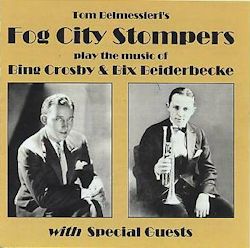1. Copenhagen
2. I Kiss Your Hand, Madame
3. Lazy Daddy
4. Just a Gigolo
5. Flock o’ Blues
6. I Found a Million Dollar Baby
7. My Pretty Girl
8. A Faded Summer Love
9. Clarinet Marmalade
10. Every Time My Heart Beats
11. Lonely Melody
12. Paradise
13. Borneo
14. Please
15. Somebody Stole My Gal
16. Just an Echo in the Valley
17. Thou Swell
18. Blue Hawaii
19. Dusky Stevedore
20. Sweet Leilani
Band:
Tom Belmessieri – Cornet all tracks except 2, 16, and 18; ukulele tracks 18 and 20; vocals all even-numbered tracks
Hudi Brenman – Clarinet, sax all tracks except 2, 16, 18 and 20
Rich Newcomb – Trombone all tracks except 2, 5, 7, 8, 11, 16, 18 and 20
Jeff Walton – Trombone tracks 2, 5, 7, 8 and 11
Mike Hart – Helicon all tracks except 2, 16, 18 and 20
Pat Dutrow – Banjo tracks 3, 5, 7, 9, 11, 15 and 19; guitar tracks 1, 4 (solo dubbed over rhythm chording), 6, 8, 10, 12, 13, 14 and 17
Morgan Olk – Piano all tracks except 2, 5, 7, 8, 11, 16, 18 and 20
Roz Temple – Piano tracks 5, 7, 8 and 11
Adam Roderick – Drums all tracks except 2, 16, 18, and 20; bells tracks 15 and 17
Guests:
Ray Lansberg – Violin tracks 2 and 16
Marty Eggers – Piano track 2 and 16
Ken Keller – Guitar track 2 and 16
Shota Osabe – Steel guitar, electronic vibraphone, electronic guitar, electronic bass tracks 18 and 20
Recorded in Oakland, California, over a two-year period, 2012-2014.
This CD, an interpretation by the Fog City Stompers of some of the work of Bix Beiderbecke and of Bing Crosby*, rather neatly divides into two “halves,”
all of the odd-numbered tracks being of the traditional jazz genre variety, and the even-numbered tracks of the pop vocal variety. The instrumentals are
tunes associated with Bix Beiderbecke, the vocals tunes associated with Bing Crosby. The juxtaposition of the two—and alternating between them throughout
the disc—is not actually disconcerting, although the two do not have a great deal in common. Certainly Beiderbecke and Crosby were peers, both having been
born within a couple of months of each other, and both were members of the Paul Whiteman aggregation for some years and even recorded together while with
Whiteman, as they did, for example, on Mississippi Mud when Crosby was part of the Rhythm Boys vocal trio. But unlike Beiderbecke, Crosby
was hardly jazz oriented, and his career as a crooner was just starting to get in gear about the time that Beiderbecke died, 1931.
Belmessieri went to considerable trouble to get the Beiderbecke selections sounding authentic, as the CD insert informs us: “The non-vocal instrumentals
were all transcribed by Tom Belmessieri from recordings performed by Bix Beiderbecke when he played with various bands.” That said, he does not try to copy
Beiderbecke himself in his playing, and the band’s renditions of the transcriptions are not an attempt at a pastiche. These are lively readings of the
Beiderbecke groups’ arrangements. The Fog City Stompers septet is tight, and executes well the difficult arrangements, even where the tempos are brisk,
such as that on My Pretty Girl with the fast tonguing required on cornet. Indeed, all of the front line rises to the challenge, with the intricate
harmonies and fast little runs, bringing them off almost flawlessly other than the occasional minor lapse, perhaps, such as the slight raggedness to be
found in places on Clarinet Marmalade. I was also a little surprised to find two of Beiderbecke’s “signature” numbers, Singin’ the Blues
and Jazz Me Blues, were not included. (Undoubtedly they will find their way into a projected “multi-volume Bix Beiderbecke CD set, to be released
next,” according to this CD’s insert.) But this CD provides a nice rendition of the numbers selected.
The even-numbered tracks present Belmessieri wearing his Crosby hat. He has a pleasant baritone voice, as did Crosby, but it is not quite as warm as was
Crosby’s. In addition, he uses more vibrato than Crosby did, but that well may be by design as it does not appear he was trying to be a Crosby clone.
However, he does include some of the Crosby “trademarks,” such as the whistling that he intersperses with the vocals on several of the tracks or the
wordless vocals he inserts as well. All of it is certainly reminiscent of the Crosby of that era and makes from some pleasant listening as well as,
perhaps, reviving old memories for some listeners. Somewhat unexpectedly, Crosby’s theme song, Where the Blue of the Night, is absent from the
tune list. A Hawaiian music fad was in the ascendant in the thirties and forties, and it is that time in the Crosby saga that the CD recalls with the final
two vocal tracks, Blue Hawaii and Sweet Leilani, steel guitar and ukulele included.
So those who count themselves among the Beiderbecke aficionados and those who are drawn to Crosby will find much to enjoy in this CD, and I would imagine
these groups are not likely to be completely disparate. The disc provides a welcome hour-plus of musical entertainment.
*Other “divided” albums compiling tracks actually recorded by Beiderbecke and Crosby have been issued in the past on labels such as RCA-Victor and
Columbia.
Bert Thompson
